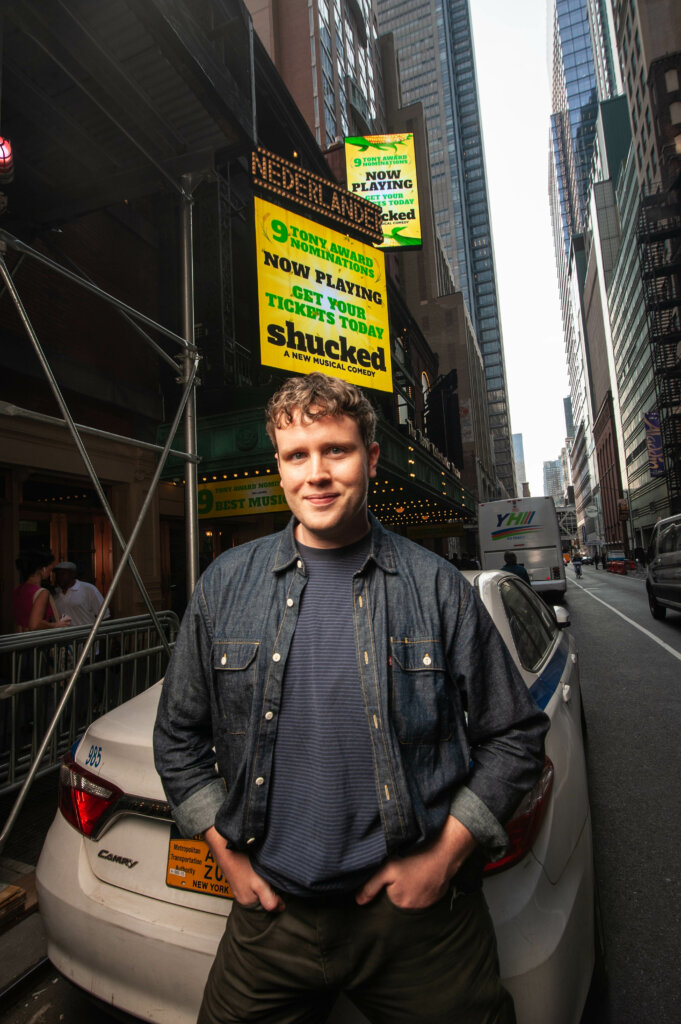by Sierra Stark Stevens
Photography by DSTO Moore
The way there isn’t broad; the path is often narrow and steep, and few hopefuls reach its illustrious stages. Here are two of the Macon natives who have travelled that path successfully – and the wisdom they’ve gained while navigating the “Broadway” that’s anything but a walk in the park.
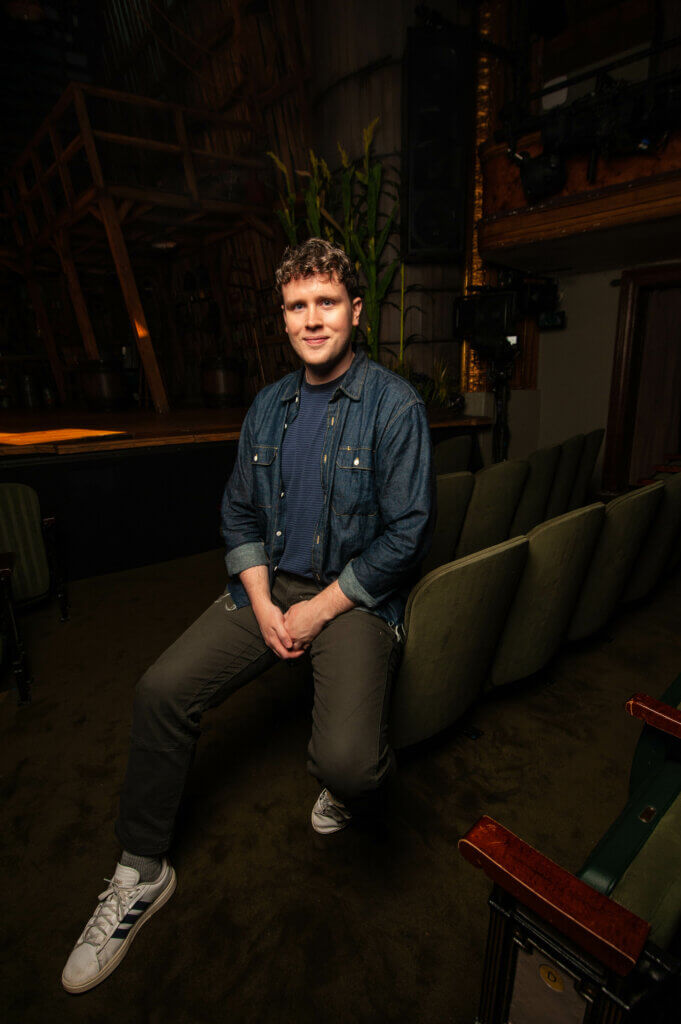
Grey Henson
Grey Henson has been performing since he was a three-year-old ballet student in Jane Madison’s dance studio. By sixteen, he was performing leading roles alongside adults at Macon Little Theatre and Theatre Macon.
After excelling in the prestigious acting program at Carnegie-Mellon University, Henson began his Broadway career by playing Elder McKinley in The Book of Mormon’s First National Tour, a stint so memorable he earned a Helen Hayes Award nomination and won the chance to perform the role on Broadway. Next, he joined the original Broadway cast of the hit musical Mean Girls, and the depth, authenticity, and pure talent he brought to his role as Damian garnered him a Tony nomination. His current project, Shucked, has been nominated for nine Tonys.
When Macon Magazine went to New York to capture Henson on Broadway, we asked who he would like to interview him for this article. He requested Jim Crisp – the retired artistic director of Theatre Macon, which he established in 1986. Crisp mentored and directed Henson throughout his childhood and young adulthood. In addition to Crisp’s Theatre Macon work, he taught at Wesleyan and Mercer and worked extensively on local nonprofit community service. “Macon is such a beautiful, special little oasis of opportunity in Middle Georgia, and I’m glad people are taking advantage of it and taking care of it,” Henson shared. If anyone was going to interview him about his professional journey beginning in Macon and leading to Broadway, Henson said, “it should be Jim Crisp.” Mentorship matters to Maconites.
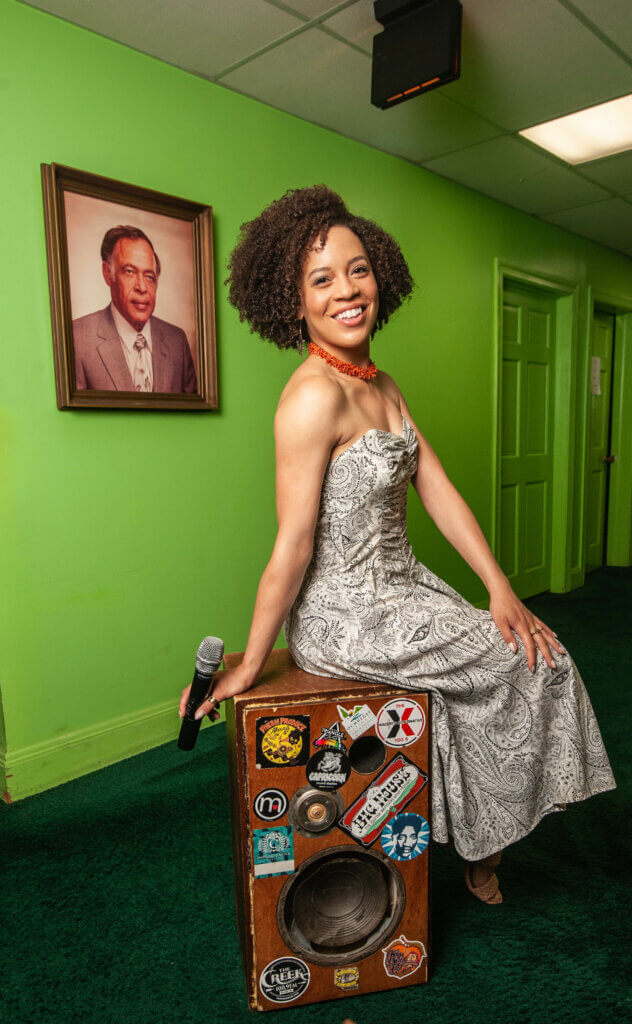 Sasha Hutchings
Sasha Hutchings 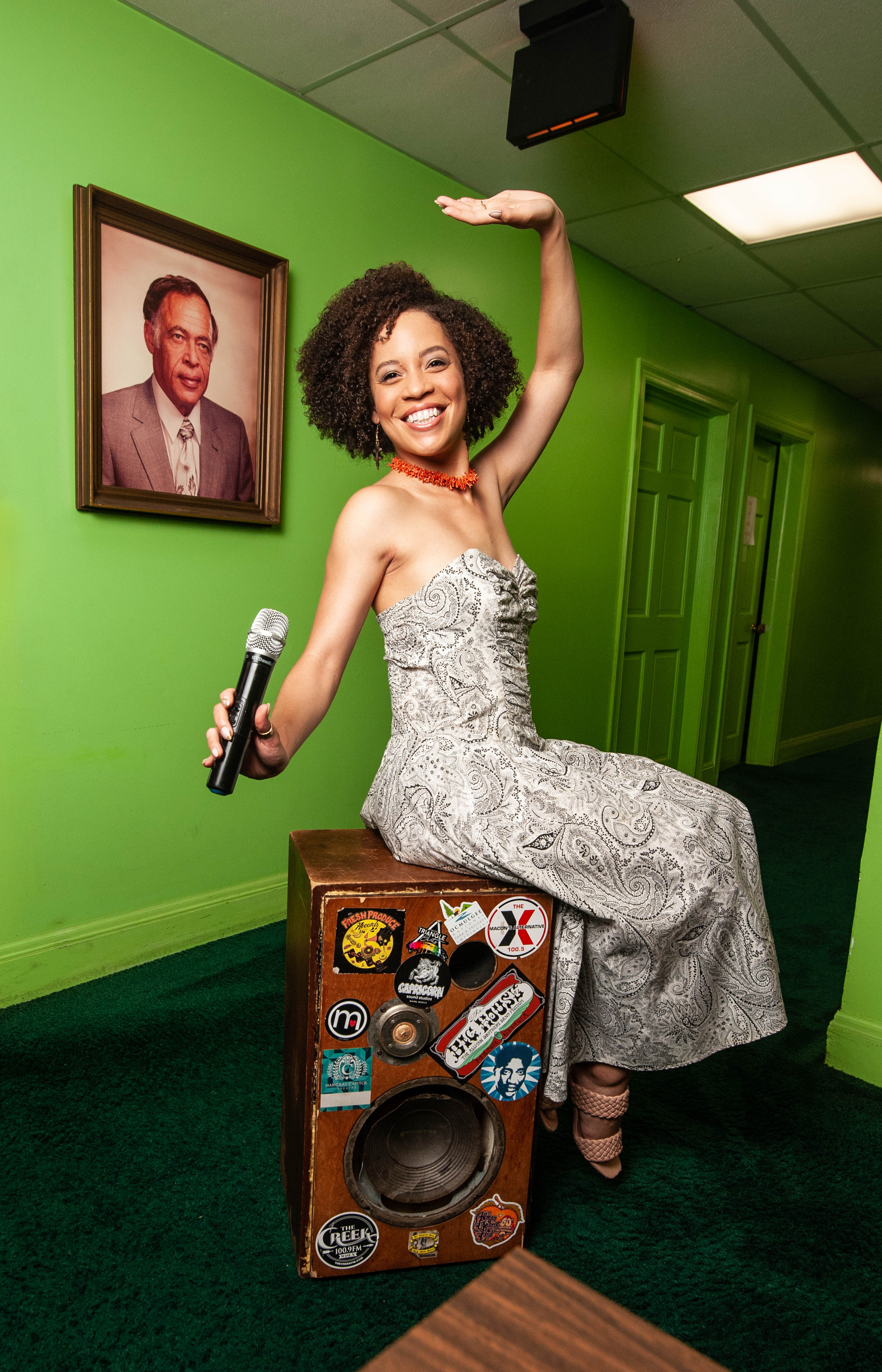


When she was growing up in Macon, you could see Sasha Hutchings in The Nutcracker at The Grand Opera House, performing in the Cherry Blossom Parade, onstage at Central High School, or at a Dance Dynamics class. Hutchings says the studio on Forsyth Road was most impactful in her childhood performing arts training.
Since she graduated from one of the nation’s leading undergraduate dance programs – Oklahoma City University – encountering her captivating stage presence has become a pricier privilege. In fact, in 2016, you were lucky if you could get a ticket at all, even for thousands of dollars; Hutchings was a member of the original Broadway cast of Hamilton, the record-breaking musical of the decade that won 16 nominations and 11 awards including Best Musical at the 70th Tony Awards.
Hutchings went on to play lead role Laurey Williams in the revisionist version of Oklahoma! on Broadway in 2019. Since then, she’s also pursued television on shows such as Run the World, Master of None, and Bluebloods. Hutchings is a teaching artist with the Arthur Miller Foundation, Epic Theatre Ensemble, and New York City Public Schools theatre programs.
Though she lives in New York City, she still calls Macon home, saying that people from a place as “steadfast, determined, and true” as Macon, people like Otis Redding, The Allman Brothers, and Little Richard – no matter how famous they become – can’t help but be grounded in this special place. Like Macon artists before her, Hutchings said, “I’m going to stay true to myself and my sound, my person and my roots, and never forget that Macon’s where I’m from. It’s super important to me.”
Hutchings asked to be interviewed by Melanie Emory, who began teaching at Dance Dynamics under the direction of the late Pam Mierlarczyk in 2002 and became director and owner of Dance Dynamics in 2008. Emory, along with Mierlarczyk and Kathryn Ginaldi, did more than teach dance classes; they got all the students on a plane to New York to see professional performances. They set their students up for lifelong success, helping Hutchings choose (and tape the audition video for) the college dance program that launched her career. Mierlarczyk handed her a college brochure – and that program’s new brochures have Hutchings’ photo on the cover. Along with Hutchings’ family, the performer said that her Dance Dynamics instructors taught her how to achieve any goal. Hutchings described the method they instilled in her as, “there’s a way to get what you need. And we’re going to get really creative and figure out how to get you there. We’ll pull the resources to Macon and get you where you want to go.” And, Hutchings continued, “that follows me in my career. When I run up against a challenge or I set a new goal, I don’t believe that anything is out of reach. I just have to figure out how to get it.”
Below are excerpts from their discussions.
Grey Henson and Jim Crisp
JC: The first thing that comes to my mind – and tell me if this is accurate – is how you were just a very aware kid, a little boy who was living in his head a lot – with a vivid imagination. Did you have a vivid imaginary life as a kid?
GH: I think I was mature for my age. And I don’t know where that really came from. But I was also very shy. I was extremely sensitive and shy and accommodating. The goal was always, oddly, to do it professionally. Does that make sense? It was never a hobby to me.
I’ve always been a performer. It started with ballet. I owe so much of my understanding of what it meant to be performer professionally to my mom, who is always the first person to tell me to do it, and to push me into it. She was never a stage mom, but just an encouraging parent.
JC: And of course, you started so young dancing. And I think that was your identity first as a performer, wasn’t it? As a dancer?
GH: Jane Madison, Madison Studios. I was the only boy in the ballet class. My mom took me to a different studio when I was three, and they turned me away. It was 1993. Then she took me to Jane, and Jane welcomed me into the class. And that was sort of my calling card – being a dancer. I love the art of ballet, but it’s a little too strict for me. I don’t really have the body type for it. There’s so much meticulous craftsmanship that goes into being a professional dancer, whereas in theater, the differences are celebrated.
And it’s sort of my little secret trick that I have – that I am secretly a great dancer. People don’t expect it because I look like a linebacker in size. But my first play was Peter Pan at Macon Little Theatre. Then I did a million at Theatre Macon.
JC: And of course, we all claim you. We all love you. Was there a moment, a show, where you thought, “Aha, I can do this. This is going to be my life?” For me as a director, one of the turning points for me watching you as a performer was when you played Curly in Oklahoma!
GH: I remember getting that role and feeling very nervous. That is a part I would not play today. I will never play that role again. Not something in my wheelhouse. But I remember feeling excited to be up to the challenge of playing a leading man. And that’s kind of something I’m itching to do again, but obviously, in a different way. I think there’s something to be said about playing the funny friend, or a supporting character, which I love doing, and I think I can inhabit really well. You rarely get to flex every single muscle you have as a performer. And I think more than anything, that production, I realized that I had a voice. All throughout high school, every move that I made was in order to pursue it professionally.
JC: Did you feel that we had prepared you well for that experience?
GH: Oh, absolutely. I remember going to school feeling prepared because I had a lot of confidence from getting to play these leading roles. Being a big fish in a little pond is one thing, but then going to Carnegie Mellon and being that big fish with a bunch of other big fish was humbling. But I was lucky at CMU, because I was different than anyone else in my class. And that’s sort of been the narrative for me ever since. I don’t fit a mold, or any sort of carbon copy of a character archetype.
But I was lucky that I was different. From then on out, I was lucky to find these jobs that fit my unique, specific abilities. I think it is the thing that I’m most proud of: I have really banked on being uniquely myself.
JC: I want to segue into the first real jumping off place for you. That was Book of Mormon. It was the first national tour of the biggest Broadway production in the country at the time. What was that like for you?
GH: At the time, it wasn’t scary at all, because I was 22. I was 22, and I was fearless. Jeez, if I could be that fearless now. I had never done anything that long before. And it’s almost the antithesis of creativity. Trying to recreate something and make it seem authentic hundreds of times. I did The Book of Mormon, in total, 1600 times.
And after two years on the road, they call asking, “Will you please go play the role on Broadway?” How am I going to turn down my Broadway debut? I get to move to New York with a job. I said yes, and I did the same role for two extra years, but in New York. In total, I did that show for four years. You start playing mind games.
The adrenaline created at the beginning of anything carries you through. Once that dies down, and the spectacle is gone, your brain needs something new to latch on to, so it finds anxiety where there once was adrenaline. I found I was really anxious as a performer after doing something for way too long.
JC: I’ve never heard it explained so well. By contrast, how exciting was the experience to go into Mean Girls, and be able to have complete freedom to create Damian on Broadway?
GH: I got to work with Tina Fey, who was an idol of mine. We watched that movie nonstop and knew every line. There was a lot of pressure in trying to bring that to the stage. But as we started rehearsals, we all realized that when you make these characters sing and dance, they’re going to be different. My Damian became much more of a theater queen, and more of a showman.
JC: I think it’s appropriate with June being Pride Month. I remember standing backstage after seeing Mean Girls with you. And you made the remark about having made a career so far of playing tap dancing, gay teenagers. I hope you remember my response to you. I said that you found the humanity in them, and you made those tap dancing, gay teenagers very important to thousands of teenage kids in those show.
GH: It’s what has been so rewarding about meeting these kids at the stage door, who now are doing productions of Mean Girls playing Damian. And it’s I look at them, and they are me. That’s what I looked like when I was in high school trying to play Curly in Oklahoma!, and now they get to play Damian.
I try to inject all of Grey Henson into them, and Grey Henson is not a stereotype. I am a person who happens to be gay. And there’s a lot about me that is flamboyant and silly and fun. But like also very deep, complex, sad, emotional person. I could transform. I want to play deep, dark, scary. I want to surprise people with what I can do. Right? I’m a trained actor. But I also celebrate the fact that I keep getting asked to play parts that are basically just me getting to exist on stage, because that representation hasn’t always existed.
JC: Where do you go from here? Where do you hope to go? What would you like to say to the kids to teenagers in Macon and everywhere about doing following careers in theater?
GH: You really never know where your career is going to go as a professional. And then about Macon. I’m so proud to say I’m from Macon. I love that it is the downtown area has evolved and is being taken care of because it’s such a special place.
I am such a nostalgic person. And I so fondly think of my adolescence in Macon and especially my time in all these theaters. Whenever I’m feeling anxious or down or uninspired, I tried to just think of the person who was doing Les Mis or The Pajama Game or Member of the Wedding in Macon. I try to think, it was just what he loved to do.
Not just for actors or young performers, you have to just find what makes your heart race and brings you joy and makes you excited, and then follow that thing. For me, it was theater. And I think if you have doubt, or if there’s ever a question whether it will happen – we have moments of weakness and fear, and we face setbacks – but at your core, you have to know: “This my calling.” I have to thank a lot of people for encouraging that. But it starts and ends with you. You have to have the right space where you can flex all those muscles. And I think Macon is such a beautiful place for that.
JC: And we’re growing and we’re getting better. It amazes me and I’ve been so thrilled to be a part of that. And, and more than that to have had the opportunity to have been a part of the lives of people like you.
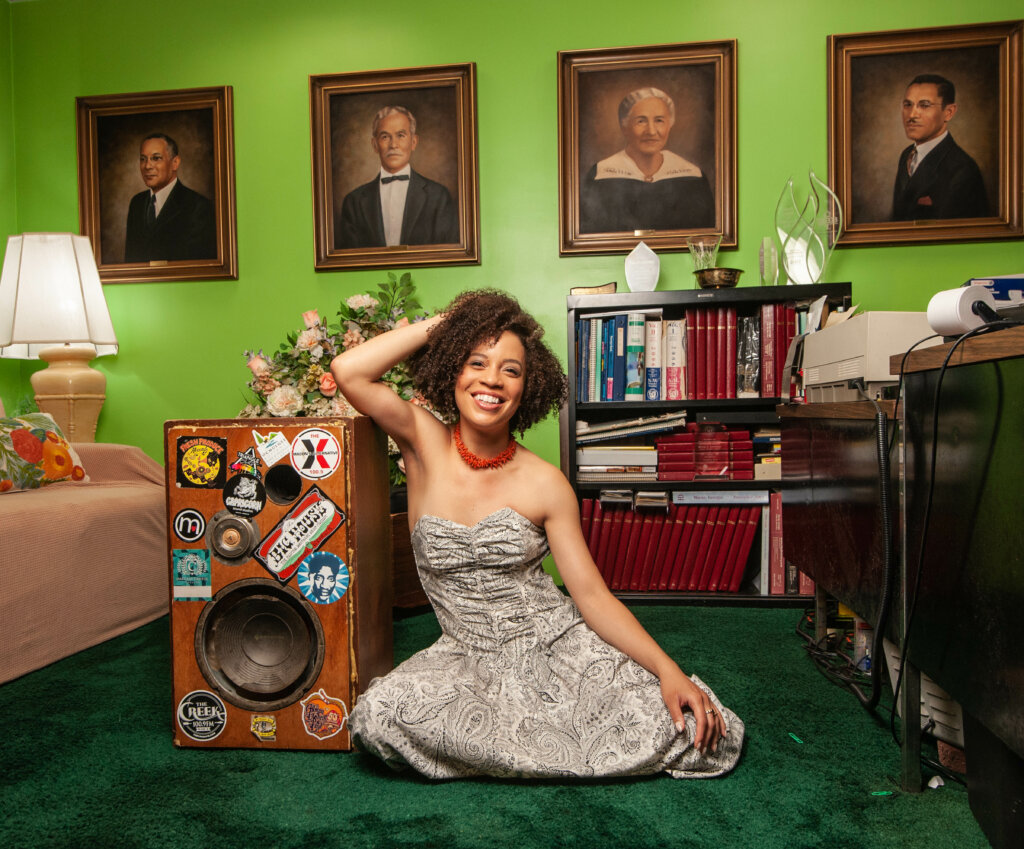
Sasha Hutchings and Melanie Emory
ME: What are you currently doing, other than auditioning?
SH: Well, auditioning doesn’t feed my soul. One TV show just premiered around the world, and there are other shows that I filmed or are being pitched. But the reality is that my day-to-day consists of a lot of auditions and keeping up my training. It’s a lot of maintenance.
To feed my soul, I have to retrain myself, to learn. I learn from books about approaches to my work, or maybe I’m reading about an artist that inspires me. They help me remember why I love doing this in the first place, which is the craft itself.
ME: With Oklahoma!, you were traveling. How was that? The good and the bad.
SH: It was really a challenge. In venue-to-venue, you have a different sound system, different setups. The auditorium looks different. Everywhere you go, your backstage is different, even where your quick changes happen, or where the microphones are set up. If you’re doing the same show every night on Broadway, there’s a lot more consistency in what’s happening. I also didn’t have friends and family close by. When you’re on the road, you only know the people connected to your production. And then you’re going home to a different hotel every week. What bed? Where is the ice machine? Can I get food after the show or not? What kind of city am I in? Is it a walking city – am I walking home? Or is it a car city – I’ve got to meet the car after the show? It’s just a lot of variables.
ME: It needs to feel like home, but you have to take it everywhere with you.
SH: There were things that I kept in my tour bag, I found this collapsible tea kettle, because I love making tea. So I would travel with a blend of tea, or I would collect tea. That was a fun thing; I would find different teas in different cities, looseleaf tea. I would carry it with me and always have tea to brew in the morning. No matter where I was, I talked to my mama, I talked to my best friend, and I did telehealth therapy every week, and that’s super grounding.
ME: Would you recommend a traveling Broadway show first when you’re just coming out? Or would you recommend just diving straight into Broadway?
SH: When you’re first starting out, you’re kind of just throwing things at the wall to see what sticks. You can be very open to a lot of different experiences. I would say don’t shut yourself off to it, but don’t only pursue that. When you’re first starting out, be open there. It’s an exciting time.
ME: What does it mean to represent Macon on Broadway?
SH: Mac-Town. I love it. I love it.
ME: Do you get any backlash for your Southern drawl or anything like that?
SH: Literally never. That’s the wonderful thing about Broadway; people are from everywhere. One of my very good friends now, I remember just sitting and listening to her talk, and I was like, “Where are you from?” And she said, “Atlanta, Georgia.” And I was like, “I knew you were from Georgia.” I just could hear it in her voice. That’s really fun.
You know, Grey Henson is on Broadway. F. Michael Haynie – he’s on Broadway. There’s so many people from Macon here in New York, and even in our community on Broadway. So it’s just really cool to see how big the world can be, and then how small it can be all at the same time.
Macon just has this legacy of music and entertainment and arts. And I, when I’m when I mention Macon, specifically – not just Georgia. When I mention Macon specifically, you’d be so surprised at how many people know Macon or know someone from Macon. I was in an audition last week, and my partner in the audition was from Macon. He went to Westside High School. I’ve lived in apartment complexes where one of the maintenance staff was from Macon and knew my family, his family knew of my family. I bought the apartment I’m in now. My realtor – he saw my area code when I called to ask about the apartment, and asked me if I was from Macon, and raved about Macon and how many musicians he knew from Macon. That speaks to how much music, Macon, and the community have provided me here in New York. So, I’m really grateful for those routes. And I’m grateful for how people connect with our city.
ME: Okay, so about Macon – what is Macon’s impact on your talent, then and now?
SH: I feel Macon’s impact on my talent when I’m when I’m home. When I visit home, and I’m working with you, or working with the studio at Dance Dynamics, or if I’m working with the Otis Redding Foundation – it’s just very generative and very creative.
There’s an “anything is possible” mentality, which is surprising because sometimes Macon can feel disconnected. Growing up, I didn’t really understand what Broadway really was or how it really works. And yet when we were in – when I was in – high school, we were taking trips to New York, and Miss Pam was putting us all on a plane saying, “Let’s go see it.” My teachers were always trying to bring it closer.
And I think it follows me in my career now. When I run up against a challenge, or I set a new goal, I don’t believe that anything is out of reach. I just have to figure out how to get it.
But I think there’s something scrappy about Macon, I do. I think about the music artists who came out of Macon, and there’s just something super steadfast and determined and true and scrappy about artists like Otis Redding, or maybe the Allman Brothers, or Little Richard – this originality and an attitude of “I’m going to make it happen and I’m going to stay true to myself and my sound, my person and my roots.” And you just never forget that Macon’s where you’re from.
If I’m home and I drive past Little Richard’s house, you know, I’m thinking, “That’s possible.”
Or I see The Otis Redding Foundation, the new building that they’re in, I’m like, “That’s the legacy of my city.”
It just is super grounding and encouraging for me being in New York, that I’m just reminded of where my roots are. It’s super important to me.
There’s rebirth after rebirth in the city. The downtown area is being revitalized. They’re building a huge music venue, or amphitheater, near the old Mall. The mall on Eisenhower. There’s always this sense of, “recreate.” It’s always creative. It’s always recreating itself, finding a new use. And it’s always something that’s rooted in community and creativity, soul food, music, all of these things. I’m super inspired by that when I come back home to see, to rediscover things, or discover something new. I’m not getting lost in what’s happening here. I’m able to contribute my own originality that’s born and bred, in Georgia – and Macon, Georgia, specifically.
ME: What tips would you have for emerging artists?
SH: My number one tip for everyone is reach out to your network. If you have a student, Melanie, and they reach out to you, and you reach out to me, you better believe that student’s going to get help.
Most people in this world are actually very willing to help if they can. It’s an important thing to remember because it doesn’t always feel that way. Sometimes, somebody might not be able to help you. They might not have the time, they might not have the resources, but it is worth asking every single time. So ask, ask, ask. Ask, ask. Ask. Always.
ME: Can we do what’s next?
SH: Yeah, we can do what’s next. I have a TV show out on STARZ that is airing this summer, called Run the World. I play Hope. She’s a very fun best friend character who is, in part, inspired by my aunt Tammy Hutchings in Macon. So there’s a fun little Easter egg for anybody from Macon who knows Tammy, and I’m getting more into some directing and directing on camera.
ME: You know I love you.
SH: I do.
ME: And I’m all proud of you. Always have been, even way back in the day.
SH: Yeah, my number one cheerleader.

